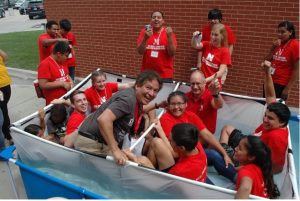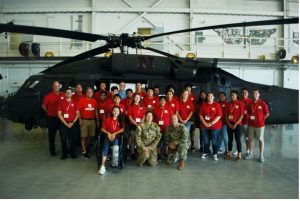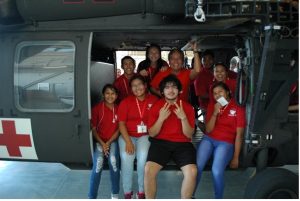From grocery store cashier to department chair: Chris Cornelius shares his journey
Author: Kristin Clague
Author: Kristin Clague
Chris Cornelius was named chair of the Department of Materials Science and Engineering at Iowa State University back in January 2021, and he now holds the Wilkinson Chair in the department. In June 2021, Ick-Jhin Rick and Hyohi Sandy Yoon provided a $2 million gift to establish the Dr. Thomas D. McGee and Dr. Ick-Jhin Rick Yoon Department Chair in Materials Science and Engineering at Iowa State University. Colleagues, students, faculty and staff will celebrate the installation of Cornelius as the inaugural holder and honor McGee and the Yoons during a medallion ceremony on Thursday, Sept. 2, 2021.
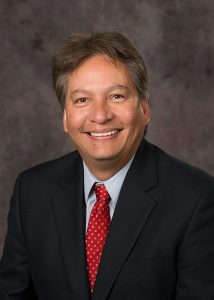
All Chris Cornelius ever wanted to be was a grocery store produce manager. When he was younger, he never dreamed of being where he is today. Now, he is the department chair of Iowa State University‘s Department of Materials Science and Engineering (MSE).
“I was married in high school, and we had our first child at 18 years old when I was a grocery store bag boy,” Cornelius said in an interview with Darryl Monteau, Native Initiatives Manager of SACNAS. “My greatest aspiration after becoming a grocery store cashier was becoming a produce manager. That is all I wanted then. My thought was, if I did that, then I would have enough money to take care of my family.”
That dream did not exactly work out.
“I remember them promoting someone else to be produce manager, and I was very upset when that happened,” he told Monteau. “I decided to join the Army to have additional money to care for my family while I was in college. The Army’s GI bill helped me pay for school, and I learned several things about myself along the way. I discovered new abilities and internal strength within myself – what I was capable of doing, pushing yourself beyond your comfort zone, and that I had a voice.”
Something else about Cornelius’s life that gives him internal strength is his Native identity: He is a member of the Oneida tribe, part of the larger Iroquois Nation. Nevertheless, this was not always viewed as a strength by others.
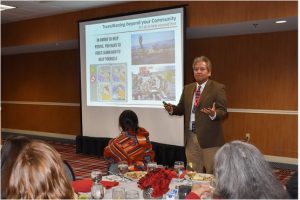
“I grew up in Montana. There were only three Native families in my high school, and I knew them all. There were hardly any of us around, and so no one was quite used to us being different,” Cornelius said. “When I was an undergraduate student at Montana State University (MSU), there was just a handful of us, and I was one of the first [Native] people that graduated in chemical engineering. It is different now – the number of Native people at MSU is far greater today than it was back then. When I was there, sometimes I saw indigenous students fail because they could not acclimate to the challenges of being different.”
Cornelius faced challenges as an undergrad – being a Native person in STEM and being a nontraditional student.
The ideas of strength and identity are an important part of Cornelius’s journey and how he arrived at his new position as MSE department chair.
“What does being part of the Oneida tribe mean to me?” Cornelius asked. “It is a place of identity that can be used as a foundation for strength. Being in the Army also gave me confidence that I have used more than once in my career. These strengths were used to help me succeed, and what I went through helped me arrive at where I am today. You know, we are all part of something. Our experiences, whoever we are, sometimes gives us an identity and strength. It is good to be able to realize where you came from, and who you are, and how you can help others.”
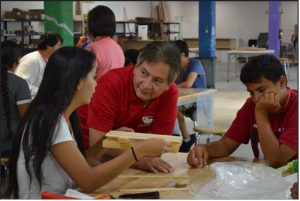
Cornelius strongly believes in helping and mentoring students, and he looks back to experiences, both positive and negative, that he has had with professors and mentors in his own life.
“When I finished my active duty time, I went to Eastern Montana College,” Cornelius told Monteau. “During that time, I had a good mentor pushing me to go even further. I had one woman who was involved in the science program at Eastern, and she said, ‘You need to go to Montana State.'”
Cornelius heeded her advice, though the transition was not always easy.
“I remember when I first arrived at Montana State, one of the professors said to me, ‘We have never had anyone graduate from here like you.’ I remember hearing that, and I was so angry. How dare this person say this to me. He was indirectly telling me that I was not going to make it. That ran against the grain of who I was,” Cornelius said. “And I said no, I would make it. Being a Native American Indian student at Montana State was difficult because there were so few of us and even fewer Natives in engineering. So you had to create mentors. I turned my professors into my ‘study group.’ I would prepare notes, prepare problems, and I would go and talk to them about the questions I had outside of class. In doing so, I was able to do well at the university.”
Not only did Cornelius do well at Montana State – he went on to be successful in industry, working at Dow Chemical and 3M.
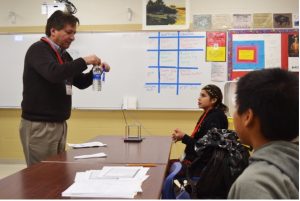
“During my time working at 3M and Dow Chemical with a B.S. in chemical engineering,” Cornelius said. “I always had an itch of wanting to become an academic. I had a professor I worked for in an organic lab doing small molecule synthesis and characterization, and he always told me, ‘Chris, you need to go into academia and become a professor. What other job can you have where you teach, do research and continually learn?’ So those words and ideas stuck with me.”
First, he needed a Ph.D.
“When I worked for Dow Chemical, I was making metallocene copolymers. The idea of creating polymers was fascinating to me. We were taking ethylene and octene molecules and combining them with propylene. Combining these molecules at different molar ratios and in different sequences enabled you to create unique copolymers – polymers that could be modified in their crystallinity, strength and ductility. I was just in love with the idea that you can take small molecules and make them do something – make them functional,” Cornelius said. “So for my Ph.D., I spent some time thinking about what school I would need to go to to learn more about that area, and at the time, Virginia Tech was one of the top three polymer schools in the nation; so I chose Virginia Tech to learn more about polymer fundamentals, or what we would call soft materials here in MSE.”
Cornelius’ positive experience at Virginia Tech was in part because of diversity.
“People were from everywhere in the world, as well as different parts of the United States. You were able to interact with them, learn from them and their experiences, their life challenges, and they became lifelong friends,” he said.
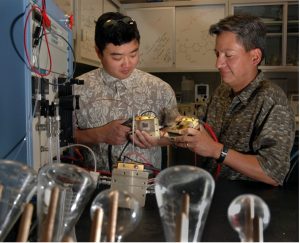
This diversity was also an important part of Cornelius’ time in industry.
“When I worked for 3M, I participated in their diversity and outreach efforts. We were doing that to create a holistic employee group that successfully engaged people locally and beyond. Moreover, to do that, you need to have a diverse mixture of people from everywhere – in doing so, you have a far more interesting mix of ideas, and those ideas lead to better solutions,” he said. “One of the rewarding things that came along with the work is getting to help people along the way. I believe people inherently help each other, whether we are talking about mentoring our children as they grow, helping faculty, or mentoring one another.”
With Cornelius, the conversation tends to keep coming back to mentoring – about the mentoring he has done for students or the mentors who have impacted his own life, even today.
“All of us need mentoring,” he said. “It does not matter where you are in your career – I have mentors today. Mentors ask us questions and challenge our decisions. They are a sounding board sometimes for ideas that we have not thought about yet. They may strengthen the development of an idea or solution to a problem – it is just inherent in who we are.”
After getting his Ph.D. from Virginia Tech, Cornelius worked at Sandia National Laboratories.
“I was there for a little over eight years. I chose Sandia because it was an interesting balance between academia and industry. Industry was very driven and mission-centered,” Cornelius said. “I became the second Native person at Sandia National Laboratories to have a Ph.D. out of more than eight thousand employees. Later, we inspired another person to do that, and we hired a couple of others, and it changed dramatically. During that time, I learned how to be a mentor ranging from high school students to scientists. My job was to build a research program that I grew into polymer science, electrochemistry, fuel cells and separations. So I hired, trained and mentored many post-docs. During my time training them, I realized that teaching is really important. I decided at that point that I was going to go back to academia to become a professor and try to start with students at the beginning of their careers.”
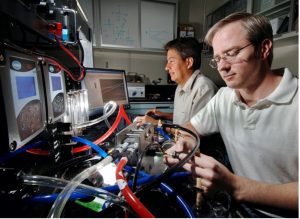
Given how important mentoring and helping others is to Cornelius, it comes as no surprise that his path eventually led to teaching. He ended up working as a chemical engineering professor at the University of Nebraska–Lincoln (UNL) and a diversity coordinator for the Mid-American Transportation Center at UNL, as well as an associate dean for research in the UNL College of Engineering: a perfect combination of all of his past experiences and things that mattered most.
“When I am teaching a class, I try to bring relevancy to the subject they [students] are learning,” Cornelius said. “Teaching involves taking abstract scientific fundamentals and showing them that there is an actual application to it. It involves helping a student discover that we are trying to train them to be more than simply someone who can answer book problems – but rather assemble information that crosses multiple dimensions and then bring that information together to solve far more complex problems. That is probably the most valuable thing one sees in industry – they want someone who can do that: Take and assess abstract ideas, write about and explain things that are not well defined, and then solidify them into reality. Whatever product you see from industry, that is what happened along the way.”
Cornelius feels this is the right time for him to be in a university setting, take on the department chair’s role, continue his research and work with students.
“Being in academia allows you to help train minds and how people think, and you get to see them at their very beginning. You can help them become critical thinkers, better communicators of ideas, and inspire them to be more successful. You are helping them think more broadly about what they could do,” he said. “When I arrived at UNL eight years ago, the Native American Commission on Indian Affairs for Nebraska reached out to me, and so I helped them for multiple years with another colleague of mine. We did many outreach activities with local tribes in Nebraska, helping them think about what they could do beyond where they are today and helping them realize that there is significant potential to who they are. When I see someone, I think, what raw material is in them that could be realized? How could they contribute? Who else would they help due to my efforts or someone else’s efforts? Sometimes it only takes a word of encouragement.”
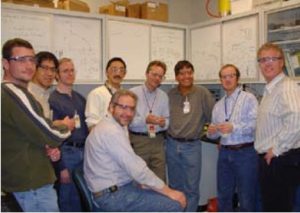
Of course, Cornelius’s material research is important: His work involves designing polymers. In his own words, his background is “pretty mixed,” working with ionomers, transport phenomena and thermodynamics. In a conversation with Cornelius, the listener gets a true sense of how much it means to him to work with others and to help people improve themselves and the world. That is what he hopes to do as chair of MSE.
“A department chair is trying to help students and faculty to achieve their best. If we do our job well, then we are helping them become more successful,” Cornelius said. “We are trying to challenge them – faculty and students – to be far more than what they are, and in doing so, we are creating a richer community.”
His biggest wish for students is to maintain curiosity and push themselves past where they think they can go – as Cornelius himself once did, beyond the life of a grocery produce manager.
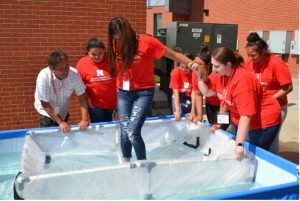
“One of the great things about being here is it is an opportunity to learn, to challenge yourself. It is okay to be uncomfortable because, through that process, you grow. Through the process of growth, you learn, and you can contribute in other ways that you never thought possible,” Cornelius said. “This is an incredible opportunity for you to embrace the unknown. You have faculty and advisors here who want to challenge you and help you learn. So I would say, embrace it, and it is going to be a fun journey.”
To learn more about Cornelius and to view video clips of an interview with him on campus, check out his welcome webpage.
